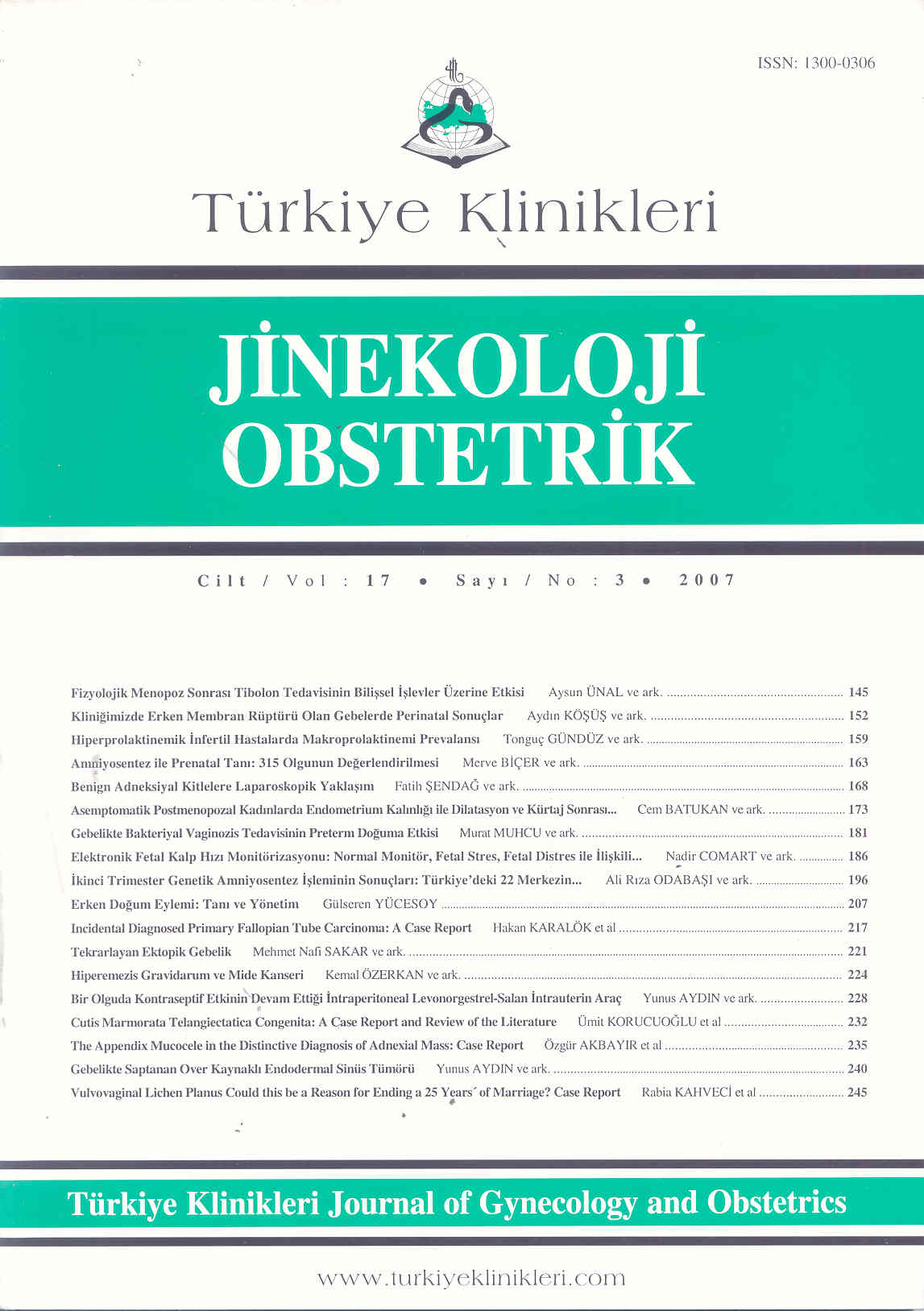Open Access
Peer Reviewed
CASE REPORTS
3406 Viewed2361 Downloaded
Recurrent Ectopic Pregnancy: A Case Report
Tekrarlayan Ektopik Gebelik
Turkiye Klinikleri J Gynecol Obst. 2007;17(3):221-3
Article Language: TR
Copyright Ⓒ 2025 by Türkiye Klinikleri. This is an open access article under the CC BY-NC-ND license (http://creativecommons.org/licenses/by-nc-nd/4.0/)
ÖZET
Dört kez ektopik gebelik geçiren bir olguyu sunarak, tekrarlayan ektopik gebelik olgularına yaklaşımla ilgili literatürü tartışmak amaçlanmıştır. Hasta, adet gecikmesi ve karın ağrısı şikayeti ile gittiği hastanede ektopik gebelik tanısı alarak kliniğimize refere edildi. Üç ektopik gebelik öyküsü olan hasta dördüncü ektopik gebelik tanısıyla kliniğe yatırıldı. Akut batın bulguları olan ve ultrasonda Douglas poşunda serbest mayi saptanan hasta operasyona alındı. Ektopik gebeliğin kaynaklandığı sağ tubada gross bir harabiyet saptanmadı. Sağ fimbrial uçtan, oluşan spontan tubal abortusa bağlı kanama izlendi. Sağ fimbrial uçta kanama kontrolü sağlandı, aspirasyon ve irrigasyon yapıldı. Tekrarlayan ektopik gebelik olgularına yaklaşım ve ektopik gebelik sonrası fertilite sonuçları literatür bilgileri ışığında tartışıldı. Tekrarlayan ektopik gebeliklerde canlı doğum oranı düşmektedir. Bu nedenle fertilite arzusu olan bu kadınlarda mümkün olduğunca tubalar korunmalıdır. Ancak iki ve üzerinde tubal cerrahi geçiren olgularda organ koruyucu müdahale her zaman mümkün olmadığından yardımcı üreme teknikleri için de hazırlık düşünülmelidir.
Dört kez ektopik gebelik geçiren bir olguyu sunarak, tekrarlayan ektopik gebelik olgularına yaklaşımla ilgili literatürü tartışmak amaçlanmıştır. Hasta, adet gecikmesi ve karın ağrısı şikayeti ile gittiği hastanede ektopik gebelik tanısı alarak kliniğimize refere edildi. Üç ektopik gebelik öyküsü olan hasta dördüncü ektopik gebelik tanısıyla kliniğe yatırıldı. Akut batın bulguları olan ve ultrasonda Douglas poşunda serbest mayi saptanan hasta operasyona alındı. Ektopik gebeliğin kaynaklandığı sağ tubada gross bir harabiyet saptanmadı. Sağ fimbrial uçtan, oluşan spontan tubal abortusa bağlı kanama izlendi. Sağ fimbrial uçta kanama kontrolü sağlandı, aspirasyon ve irrigasyon yapıldı. Tekrarlayan ektopik gebelik olgularına yaklaşım ve ektopik gebelik sonrası fertilite sonuçları literatür bilgileri ışığında tartışıldı. Tekrarlayan ektopik gebeliklerde canlı doğum oranı düşmektedir. Bu nedenle fertilite arzusu olan bu kadınlarda mümkün olduğunca tubalar korunmalıdır. Ancak iki ve üzerinde tubal cerrahi geçiren olgularda organ koruyucu müdahale her zaman mümkün olmadığından yardımcı üreme teknikleri için de hazırlık düşünülmelidir.
ANAHTAR KELİMELER: Ektopik, gebelik; tekrarlama
ABSTRACT
It is aimed to discuss the literature related with the management of recurrent ectopic pregnancy cases by presenting a case which had four times of ectopic pregnancy. The patient who had delayed menstruation and abdominal pain was reffered to our clinic with the diagnosis of ectopic pregnancy. The patient with 3 ectopic pregnancy before was hospitalized with the diagnosis of the forth ectopic pregnancy. The patient was operated so that she hade acute abdomen with free fluid in the Douglas's pouch in ultrasound. Bleeding was detected due to spontaneous tubal abortus from the distal end of right fimbria, while no gross injury was observed in the right fallopian tube. Hemostasis was sustained in the right fimbrial end; aspiration and irrigation was done. Management of recurrent ectopic pregnancy cases and results of fertility after ectopic pregnancy were discussed according to the literature. The rate of live birth is decreased in recurrent ectopic pregnancies. Thus, fallopian tubes must be preserved in such women with reproductive demand. Preparation for the assisted reproductive techniques must also be considered in cases having two or more tubal surgeries, since the organ conservative surgery is not convenient in most of the cases.
It is aimed to discuss the literature related with the management of recurrent ectopic pregnancy cases by presenting a case which had four times of ectopic pregnancy. The patient who had delayed menstruation and abdominal pain was reffered to our clinic with the diagnosis of ectopic pregnancy. The patient with 3 ectopic pregnancy before was hospitalized with the diagnosis of the forth ectopic pregnancy. The patient was operated so that she hade acute abdomen with free fluid in the Douglas's pouch in ultrasound. Bleeding was detected due to spontaneous tubal abortus from the distal end of right fimbria, while no gross injury was observed in the right fallopian tube. Hemostasis was sustained in the right fimbrial end; aspiration and irrigation was done. Management of recurrent ectopic pregnancy cases and results of fertility after ectopic pregnancy were discussed according to the literature. The rate of live birth is decreased in recurrent ectopic pregnancies. Thus, fallopian tubes must be preserved in such women with reproductive demand. Preparation for the assisted reproductive techniques must also be considered in cases having two or more tubal surgeries, since the organ conservative surgery is not convenient in most of the cases.
MENU
POPULAR ARTICLES
MOST DOWNLOADED ARTICLES





This journal is licensed under a Creative Commons Attribution-NonCommercial-NoDerivatives 4.0 International License.










